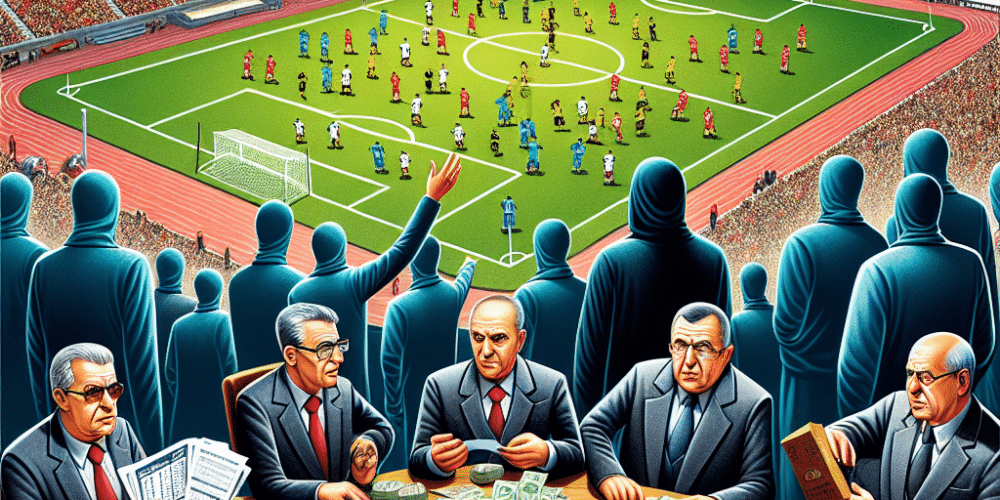In a startling revelation, the Turkish soccer federation has uncovered an insider betting scandal involving 371 out of 571 match officials, shaking the core of the country’s beloved sport. These findings have come after a comprehensive five-year investigation aimed at rooting out unethical practices within Turkish soccer.
At a press conference held in Istanbul, Ibrahim Ethem Haciosmanoglu, the president of the Turkish soccer federation, provided detailed insights into the situation. He expressed his deep disappointment and criticism towards those officials who had broken the rules by participating in sports betting. Although he refrained from naming the individuals involved, the numbers presented were alarming enough to speak volumes. The investigation highlighted that out of the 371 officials with betting accounts, 152 were identified as regular bettors. These figures included 7 referees, 15 assistant referees, 36 classified referees, and 94 assistant referees.
While some officials merely experimented with betting, placing only a few wagers, the investigation revealed a more troubling picture with several others. Specifically, 42 officials were found guilty of placing bets on more than 1,000 soccer games, with one official standing out by placing an extraordinary total of 18,227 bets. This level of enthusiasm for betting among those tasked with upholding the integrity of the game poses significant ethical concerns.
The scandal comes at a time when Turkey, like many nations, enforces strict regulations against insiders participating in betting activities to maintain the integrity of sports. The federation now faces the challenge of bringing the erring officials to justice while working to restore faith in the sport. Haciosmanoglu emphasized the importance of this cleanup operation, stating that the future of Turkish soccer hinges on “cleaning up the dirt.” His remarks underscore the need for decisive action and the implementation of appropriate penalties for the officials involved.
This revelation has been met with a mixed response from the soccer community. On one hand, major Turkish soccer clubs have welcomed the findings, seeing them as a crucial step towards purifying the sport and regaining public trust. They recognize this as an opportunity to address underlying issues and emerge stronger. On the other hand, some pundits and commentators have voiced concerns, suggesting that league matches should be suspended until the investigation is thoroughly completed. Additionally, there are calls to consider bringing in foreign referees to ensure impartiality during this turbulent period.
Despite the intent to rectify the situation, some worry about the broader implications of the scandal. Innocent referees may face undue scrutiny due to the actions of their colleagues, potentially affecting their professional reputations and careers. Furthermore, the international reputation of Turkish soccer is at risk. The scandal could lead to a decline in global trust, affecting everything from international collaborations to the development of future talent.
While the current situation is undeniably disappointing, there is a glimmer of hope that this will lead to a fresh start for Turkish soccer. Stakeholders are optimistic that this turning point will usher in an era free from controversy, where transparency and fairness are prioritized. However, the path forward will not be without challenges. The Turkish soccer community must come together to support reforms and ensure that such incidents are prevented in the future.
In the aftermath of this scandal, a critical examination of the structures and policies governing Turkish soccer is inevitable. There will be a push for stricter regulations and more robust oversight mechanisms to prevent any recurrence of such breaches of integrity. The federation will likely face pressure to implement swift changes to restore credibility and ensure that the sport is governed by the highest ethical standards.
As Turkish soccer navigates through this crisis, it is clear that the need for reform is pressing. The sport’s leaders, along with dedicated fans and players, must work collaboratively to rebuild the sport’s reputation and safeguard its future. Only through collective effort and a commitment to integrity can Turkish soccer hope to turn this regrettable chapter into a catalyst for positive change and renewal.

David Harrison stands tall in gambling journalism, marrying his firsthand casino experiences with a deep understanding of betting psychology. His articles transform complex gambling jargon into engaging tales of strategy and chance, making the world of betting accessible and enjoyable. David’s knack for narrative extends beyond print, making him a sought-after speaker on gambling trends and future bets. In the realm of gambling, David is both a scholar and a storyteller, captivating readers and listeners alike.
















